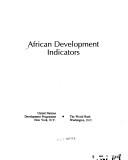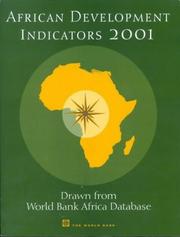| Listing 1 - 10 of 40 | << page >> |
Sort by
|

ISBN: 0821320440 9780821320440 Year: 1992
Abstract | Keywords | Export | Availability | Bookmark
 Loading...
Loading...Choose an application
- Reference Manager
- EndNote
- RefWorks (Direct export to RefWorks)

ISBN: 0821348647 9786610088263 1280088265 0585459045 Year: 2001
Abstract | Keywords | Export | Availability | Bookmark
 Loading...
Loading...Choose an application
- Reference Manager
- EndNote
- RefWorks (Direct export to RefWorks)
AFR / Africa - Afrika - Afrique --- 338.340 --- 307.0 --- 331.30 --- 305.2 --- Algemene ontwikkeling in de Derde Wereld. --- Algemene statistische documentatie. Statistische jaarboeken. Grafieken. Statistische gegevensbanken. --- Economische toestand. --- Statistieken van de conjunctuur. --- Algemene ontwikkeling in de Derde Wereld --- Algemene statistische documentatie. Statistische jaarboeken. Grafieken. Statistische gegevensbanken --- Economische toestand --- Statistieken van de conjunctuur
Book
Abstract | Keywords | Export | Availability | Bookmark
 Loading...
Loading...Choose an application
- Reference Manager
- EndNote
- RefWorks (Direct export to RefWorks)
This second edition of Health at a Glance: Latin America and the Caribbean, prepared jointly by OECD and the World Bank, presents a set of key indicators of health status, determinants of health, healthcare resources and utilisation, healthcare expenditure and financing, quality of care, health workforce, and ageing across 33 Latin America and the Caribbean countries. Each of the indicators is presented in a user-friendly format, consisting of charts illustrating variations across countries, and over time, brief descriptive analyses highlighting the major findings conveyed by the data, and a methodological box on the definition of the indicators and any limitations in data comparability. This edition of Health at a Glance: Latin America and the Caribbean also provides thematic analyses on two key topics for building more resilient health in the LAC region: the impact of the COVID-19 pandemic on LAC healthcare systems, and climate change and health.
Book
Year: 1979
Abstract | Keywords | Export | Availability | Bookmark
 Loading...
Loading...Choose an application
- Reference Manager
- EndNote
- RefWorks (Direct export to RefWorks)
Book
ISBN: 9264087087 9567947910 Year: 2012 Publisher: Washington, D.C. : The World Bank,
Abstract | Keywords | Export | Availability | Bookmark
 Loading...
Loading...Choose an application
- Reference Manager
- EndNote
- RefWorks (Direct export to RefWorks)
La educacion terciaria transfronteriza se refiere al traslado de personas, programas, proveedores, curriculos, proyectos, investigaciones y servicios de la educacion terciaria (o superior) cruzando limites jurisdiccionales nacionales. La educacion transfronteriza es un subconjunto de la internacionalizacion educacional. El foco de este volumen se pone en la movilidad de los estudiantes, programas e instituciones proveedoras. En esta publicacion, el Banco Mundial y la OCDE combinan su experiencia y conocimiento para explorar modos en los cuales la educacion terciaria transfronteriza podria beneficiar los esfuerzos de los paises en desarrollo para construir capacidades; el libro tambien busca guiar los esfuerzos de politicas relacionadas con las areas del aseguramiento de la calidad y las negociaciones comerciales. La internacionalizacion esta llevando a los paises a revisar el espectro de sus politicas de educacion terciaria. Esta publicacion proporciona ideas valiosas para los constructores de politicas, los interesados en educacion, las agencias donantes y los que la reciban y abre nuevas areas de investigacion en el tema de la educacion terciaria transfronteriza y en la capacidad para el desarrollo.
Book
ISBN: 128210327X 9786612103278 9264051384 9264050892 9789264051386 Year: 2009 Publisher: Paris, France : OECD/World Bank,
Abstract | Keywords | Export | Availability | Bookmark
 Loading...
Loading...Choose an application
- Reference Manager
- EndNote
- RefWorks (Direct export to RefWorks)
This joint OECD and World Bank review gives a brief overview of post-secondary education in Chile and describes its development over the past twenty years. It presents an analysis of the system and identifies key directions for policy reform in light of the challenges encountered by officials, communities, enterprises, educators, parents and students. It concludes with a set of key recommendations concerning the structure of the system and its labour market relevance; access and equity, governance and management; research, development and innovation; internationalisation; and financing.
Education, Higher -- Chile. --- Education, Higher. --- Research -- Chile. --- Education, Higher --- Research --- Education --- Social Sciences --- History of Education --- Law and legislation --- College students --- Higher education --- Postsecondary education --- Post high school education --- Post-secondary education --- Tertiary education --- Universities and colleges --- Chile
Book
ISBN: 9264037217 9264037209 Year: 2007 Publisher: Paris : OECD Publishing,
Abstract | Keywords | Export | Availability | Bookmark
 Loading...
Loading...Choose an application
- Reference Manager
- EndNote
- RefWorks (Direct export to RefWorks)
Education --- Kazakhstan
Book
ISBN: 9264065474 Year: 2008 Publisher: Bogotá : Mayol Ediciones S.A.,
Abstract | Keywords | Export | Availability | Bookmark
 Loading...
Loading...Choose an application
- Reference Manager
- EndNote
- RefWorks (Direct export to RefWorks)
Book
ISBN: 9264266917 9264266909 Year: 2016 Publisher: Paris : OECD Publishing,
Abstract | Keywords | Export | Availability | Bookmark
 Loading...
Loading...Choose an application
- Reference Manager
- EndNote
- RefWorks (Direct export to RefWorks)
Storms, hurricanes, and cyclones have been a feature of life on Small Island Developing States (SIDS) for centuries. But climate change is now increasing the intensity of these disasters, as well as creating new developmental challenges - like rising sea levels and increasing ocean acidity - which not only challenge the development models of these countries. They challenge and threaten their own existence. This report examines the nature, scope and volume of concessional finance directed to SIDS to build resilience to climate change and natural disasters. It identifies challenges in the provision and use of financing for resilience. Yet, it is not just about challenges. It also illustrates the positive steps that SIDS are taking – and in many cases leading – to ensure that climate and disaster resilience is addressed as an integral part of their development. The report offers targeted recommendations to enhance the scope and quality of resilience financing, calling for the international community to consider financing for climate and disaster resilience that is appropriate for the challenges that SIDS face. The report is a jointly funded initiative of the OECD and the Global Facility for Disaster Reduction and Recovery (GFDRR) at the World Bank.
Climatic changes --- Economic aspects --- Changes, Climatic --- Changes in climate --- Climate change --- Climate change science --- Climate changes --- Climate variations --- Climatic change --- Climatic fluctuations --- Climatic variations --- Global climate changes --- Global climatic changes --- Climatology --- Climate change mitigation --- Teleconnections (Climatology) --- Environmental aspects --- Global environmental change
Book
ISBN: 9264202102 Year: 2013 Publisher: Washington, D.C. : Washington, D.C. : The World Bank, The World Bank,
Abstract | Keywords | Export | Availability | Bookmark
 Loading...
Loading...Choose an application
- Reference Manager
- EndNote
- RefWorks (Direct export to RefWorks)
This second edition of Integrating Human Rights into Development consolidates the findings and research compiled in 2006 with key developments and activities that have occurred in the intervening seven years. It builds upon the review and findings of the first edition, so that much of that material in that first edition is preserved in this publication. Like the first edition, this study seeks to advance understanding of the nexus between development and human rights through a systematic consideration of donor approaches. It also seeks to enhance understanding among donors of how to work collectively to advance the strategic and coherent integration of human rights in development in light of agencies’ roles and areas of comparative advantage. This publication brings together the key political and policy statements of recent years with a discussion of the approaches and experiences of bilateral and multilateral agencies engaged in integrating human rights into their development cooperation activities.
Development --- Governance --- Human rights --- Economic development --- Law, Politics & Government --- Human Rights --- Development, Economic --- Economic growth --- Growth, Economic --- Economic policy --- Economics --- Statics and dynamics (Social sciences) --- Development economics --- Resource curse
| Listing 1 - 10 of 40 | << page >> |
Sort by
|

 Search
Search Feedback
Feedback About UniCat
About UniCat  Help
Help News
News